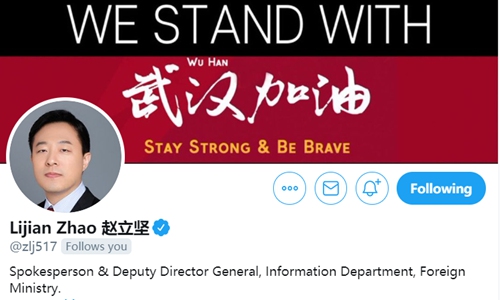HOME >> CHINA
US media miss the point Chinese diplomats convey
By Li Aixin Source:Globaltimes.cn Published: 2020/3/25 3:12:56

Photo: Screenshot of Twitter account of Chinese Foreign Ministry spokesperson Zhao Lijian
After the "Axios on HBO" interview with China's Ambassador to the US Cui Tiankai was aired, some US media missed the point of diversified voices in China's political arena, but rather hyped why there is a "split" in his statement from that of Chinese Foreign Ministry spokesperson Zhao Lijian, with experts noting they have failed to understand the information that Chinese diplomats have conveyed.
When asked about the recent hype over where the novel coronavirus originated, the ambassador articulated in the interview that, eventually, "we must have an answer to where the virus originally came. But this is a job for the scientists to do, not for diplomats, not for journalists to speculate, because such speculation will help nobody."
Cui's remark sent three messages, according to Shi Yinhong, director of Renmin University's Center for American Studies.
"The ambassador refuted the behavior of different US forces, including top politicians, to put the blame on China for the outbreak; Cui did not mention anything that suggests coronavirus may have originated from the US; and he emphasized the significance of cooperation during the interview," Shi told the Global Times.
US media, however, have turned their focus on something else, calling it a "rare spat" between Chinese diplomats highlighting Cui's statement and a tweet by Zhao on Twitter.
On March 12, Zhao tweeted speculation that "it might be the US army that brought the epidemic to Wuhan." Soon after, US President Donald Trump, who used to stick to the term "coronavirus" on formal occasions, started to repeat "Chinese virus" time and again.
According to reports, he crossed out "corona" on his notes and replaced it with the word "Chinese" before a daily White House Coronavirus Task Force briefing on March 19. Not to mention some other US politicians and US media have continued calling it "Wuhan virus" from the very beginning of the outbreak without solid evidence to prove it did originate in Wuhan, or China.
Analysts point out that although both Cui and Zhao are both Chinese diplomats, the heavyweight of their expressions are different as those opinions were raised on different occasions.
"Cui was in a formal interview as Chinese ambassador to the US. What he said surely represents the Chinese government," said Zhang Jiadong, professor at the Center for American Studies, Fudan University, adding Zhao posted his personal views on Twitter, not during a press conference of the Chinese Foreign Ministry or any other official event.
That being said, the tweets represent his own views, and don't carry the same authority as Cui's remarks, Zhang noted.
In February, during another interview about the COVID-19 epidemic with US media National Public Radio, Cui said, "There is a need for the two countries to cooperate because this is a challenge to the entire international community," yet he also pointed out that some US politicians and media "are not being so helpful."
Observers noted Cui's remarks in different interviews showed his consistent stance, which represent China — joint efforts between China and the US are needed as the pandemic is tightening its grip on the globe and struggles over conspiracy theories should not become a core issue in bilateral ties or diplomacy.
"Moreover, it is normal to see different people expressing different views, even within the same government," said Zhang, adding it proves the country has diversified voices and a democratic decision-making system.
It is in the media's nature to hype everything that catches attention, including political gossip, but US media should be careful not to miss the real message Chinese diplomats are trying to send to the US, said observers.
Posted in: DIPLOMACY